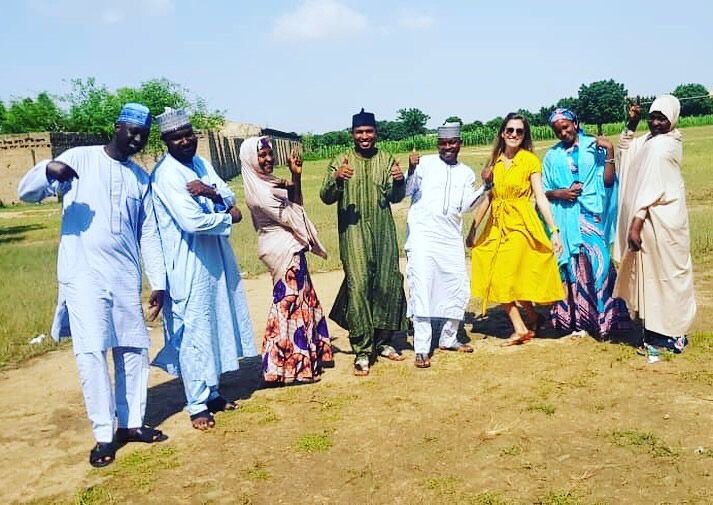What do we really know about nation-building?
If we gave our greatest minds the project to take a group of people around the world and build a nation, could they do it? What if the borders for said nation were drawn haphazardly on a map by a person who has no local knowledge of the area? What would they achieve?
This question seems absurd because, in simple terms, a nation has an organic element to it, with a group of people or multiple sub-groups of people coming together around a shared purpose that eventually morphs into a nation-state (Anderson 2006)..
Africa, however, was violently shattered into pieces that did not correspond to long-established groups of people—such as the split of the Hausa between Niger and Nigeria (Miles 2015)— and the colonists did nothing more than to temporarily unite people within these borders in an effort to remove their oppressors (Fanon 1963). Once independence was gained, those within these haphazard borders were tasked with building a unified nation with groups of people who would likely not have naturally morphed together, leaving traces of the violent colonial past that shapes their present ties to the nation (Fincham and Dunne 2020).
Although even our greatest minds could arguably not have the wherewithal to build a strong nation when the necessary first step had been forcefully skipped, many in the global north look at Africa as if it has failed.
The truth is that the colonizers failed and left Africa with the responsibility to build a masterpiece without the necessary base materials to which the colonizers themselves had access (wa Mutua 1994). For that reason, it is of utmost importance that we more deeply understand ongoing national identity building, particularly in the African context.
Schools hold an especially powerful role as socializing institutions (Abowitz & Harnish, 2006; Hess & Torney-Purta, 2005; Russell & Bajaj, 2015) through which the perceptions, identities, and notions of citizenship or young people are contoured through their school experience (Reisner, 1922; Weber, 1976). Within Africa, generally, and Nigeria, specifically, strong group categorizations shaped by the colonization period compete with nationalistic notions of citizenship, challenging national unity efforts (Keller 2014).
This research looks more closely at national identity in ethnically and religiously diverse Nigerian secondary schools that were specifically designed with the purpose to enhance national unity. This research also seeks to understand the shifting identities of young people, who are at the prime of their identity forming years (Erikson 1968; Irwin 1991).
We see a great deal of research on national identity, but how is national identity shaped within schools in a context where borders were haphazardly drawn?
This research contributes to a gap in understanding about national identity formation in secondary schools in a diverse nation with a history of colonial manipulation that has interrupted and redirected the natural binding together of groups. This is particularly relevant as the global community works to achieve the Sustainable Development Goals (SDGs) by 2030 with SDG 4.7 focused on education promoting “…a culture of peace and non-violence….and appreciation of cultural diversity” (UN General Assembly 2015, p. 17).
Using data from a survey with 643 students in eight diverse Nigerian secondary schools (FUCs and state schools), this research highlights the potential of a diverse experience within schools (see also, Dewey, 2013; Milner & Tenore, 2010; Prati et al., 2018; Prati & Cicognani, 2018) to reshape one’s relationship to the nation and with others (see Osterman, 2000; Turner et al., 1987). These findings therefore lend valuable insight into the potential of schools to reshape student relationships to the nation.
Nigeria grants the unique opportunity to closely observe the ways young people and those within schools work together to construct notions of national, ethnic, and religious group belonging and exclusion through the Federal Unity Colleges (FUCs). The FUCs are secondary boarding schools that utilize a nationwide quota system to ensure an ethnically representative student body. In other words, ethnic and religious groups from around the country are represented within a single school. FUCs simultaneously attempt to unite students as “Nigerian” while also celebrating diversity (Anon 2013).
As shown in the survey results presented in the paper, students’ experience within schools and particularly in a diverse unity school setting appears to shift their identity to the nation. As students progress through the system, and particularly those in unity schools, they shift from a national identity linked to an uncritical patriotism belonging to a particular ethnic group (ethnic national identity) toward a more interconnected concept of civic national identity that allows the nation to better handle diversity (Putnam 2007; Reeskens and Wright 2013; Wakefield et al. 2011).
The findings that this research presents indicate the important relationship between school and the power to shape national identity; a relationship that should be given particular attention by ministries of education and other education/development sector organizations seeking to influence the way citizens relate to each other and the nation.
This paper contributes to existing literature exploring the relationship between schools and nation-building and between ethnic/religious identity and national identity. It also contributes to policy considerations related to diverse schools in developing contexts and peacebuilding/nation-building through education.
Read the full article here.
